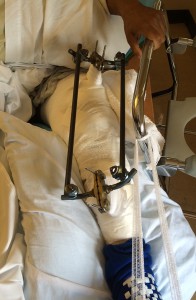 If you are noticing a loss of turbo boost with your truck, it could be a simple fix you can perform yourself. Sometimes, the cure for this problem is just replacing a clamp or hose on the pipes that carry air from the turbocharger to the charge-air-cooler and/or the pipe from the charge-air-cooler to the intake manifold on the driver’s side of the engine. Those are the first places you want to look when the turbo boost gauge is reading low. No boost gauge, you say? Well, our turbo boost gauge kit is only $68.00, and it is very simple to install. You cannot drive a truck efficiently without this gauge.
If you are noticing a loss of turbo boost with your truck, it could be a simple fix you can perform yourself. Sometimes, the cure for this problem is just replacing a clamp or hose on the pipes that carry air from the turbocharger to the charge-air-cooler and/or the pipe from the charge-air-cooler to the intake manifold on the driver’s side of the engine. Those are the first places you want to look when the turbo boost gauge is reading low. No boost gauge, you say? Well, our turbo boost gauge kit is only $68.00, and it is very simple to install. You cannot drive a truck efficiently without this gauge.
I recommend that you carry one hose and two clamps with you at all times, just in case one blows or the clamp breaks while out on the road. The hose usually blows when the engine is producing gobs of horsepower pulling a hill, which is when the turbo boost is at its highest peak. When the hose blows, the pressure that usually goes into the engine is now lost into the atmosphere, and all of the pressure that was built up in the turbocharger compressor housing is now lost, too. This boost pressure also holds the oil in the bearing housing of the turbo, and there is a chance that the boost will go behind the compressor wheel and push back on the oil seal, which is just a small piston ring about the size of a nickel. It is not a rubber seal, so it requires pressure to keep the oil in the bearing housing.
Most of the time, when the hose blows, oil will be present in the charge-air-cooler pipe, along with the compressor housing. All you typically have to do is wipe out most of the oil with a rag or towel, install the new hose and clamp, and put her in the wind. After about 100 miles or so, remove the clamp that holds the elbow coming from the discharge end of the compressor housing and look inside for oil. Also, look in the compressor housing for oil (most of the time it will be dry). When you get home, remove the compressor housing from the turbocharger and wash it out. Turbos do collect dirt in the housing and on the compressor wheel, and should be cleaned about once a year. You should also remove all of the intake piping and the air filter and clean the filter housing out, along with the piping. Then, spray all of the piping and elbows with white lithium grease on the inside. The grease will help to collect dirt and ward off road salt spray and mag chloride, which is very harmful to your engine.
 Another item that can cause oil to run out of the compressor side of the turbocharger is a wet or very dirty air filter. Heavy downpours will get into the air filters and restrict the air-flow to the engine and pull oil out of the turbo. Again, remove the air filters and discard them. This will not happen to the Fleet-Air filters, so install them and never worry about paper filters again (you will also gain about 1/4 mpg). We have all of the Fleet-Air filters you will need in stock. The two problems I spoke about that pull oil out of the turbo will NOT hurt the oil seal – just repair the problem and then, a few hours later, there will not be any trace of wet oil in the compressor side of the turbocharger.
Another item that can cause oil to run out of the compressor side of the turbocharger is a wet or very dirty air filter. Heavy downpours will get into the air filters and restrict the air-flow to the engine and pull oil out of the turbo. Again, remove the air filters and discard them. This will not happen to the Fleet-Air filters, so install them and never worry about paper filters again (you will also gain about 1/4 mpg). We have all of the Fleet-Air filters you will need in stock. The two problems I spoke about that pull oil out of the turbo will NOT hurt the oil seal – just repair the problem and then, a few hours later, there will not be any trace of wet oil in the compressor side of the turbocharger.
On an entirely different note, a great friend and longtime client of Pittsburgh Power recently had a terrible accident while trying to start his T-600 KW with a screwdriver. The ignition switch was faulty – KW sold him the wrong switch – so the screwdriver was his only option to get his load delivered. While kneeling on the front tire, the truck started and then rolled back, and down under it he went. The left steer tire rolled over his left thigh, breaking his femur bone in three places. As this happened, 66-year-old veteran trucker Rudy Broadnax experienced a surge of adrenaline and was somehow able to physically turn the tire, while under it, and roll the truck off of him! This saved his right leg from that same fate. To this day, he still can’t explain how in the world he managed to forget to set the brake.
Rudy’s message to younger drivers is to learn from his mistake. Setting your brake every time you stop must be part of your routine. He is fortunate that he did not die, however, the doctors told him he may never walk again. Rudy loves to drive his truck and dance with his wife, and his goal is to be able to do both of these things again. He said, “I will be back in the saddle!” Needless to say, it will take months for his injuries to heal, and his wife has moved all of their belongings into their daughter’s home, in order to be closer to the hospital. If you could find the heart to donate just $5, $10 or $20 (or more, obviously), Rudy and his wife Vonda sure could use your help. You will be helping out someone just like yourself – a fellow owner operator – and you will forever have Rudy and his family’s blessings and gratitude, as well as mine. Please go to www.gofundme.com/ez172o if you feel it in your heart to make a donation to this worthy man and his family.
 My final thought this month is about health – your health. I have been trying to lose 15 pounds for the past five years, but every time I lose it, it comes right back. While working the truck show in Dallas last summer, an owner operator and his wife came into my booth. I was just with them five months earlier, and they both looked so different that I had to look at their name tags to see who they were! I asked, “What did you do?” He said that he had lost 65 pounds in five months and his wife had lost 45. I was shocked, and asked how they did it. To my surprise, they said it was easy – just eat Medifast six times a day! Medifast had a booth in the show so I went to it and met another owner operator that went from 470 pounds to 330 (his goal is to get to 220). They had samples of the food there, and they were good, so I signed up. In about three days, I received my one-month supply of food, and I did lose my 15 lbs. in about 2.5 weeks. When I go away for a weekend, I put on 1 lb. per day eating like I used to, but as soon as I get home, I’m back on the program and that extra weight is gone. If you are interested, call Carolyn Nilsen at (503) 504-6735 – she lost 100 lbs. and the weight has stayed off for three years now!
My final thought this month is about health – your health. I have been trying to lose 15 pounds for the past five years, but every time I lose it, it comes right back. While working the truck show in Dallas last summer, an owner operator and his wife came into my booth. I was just with them five months earlier, and they both looked so different that I had to look at their name tags to see who they were! I asked, “What did you do?” He said that he had lost 65 pounds in five months and his wife had lost 45. I was shocked, and asked how they did it. To my surprise, they said it was easy – just eat Medifast six times a day! Medifast had a booth in the show so I went to it and met another owner operator that went from 470 pounds to 330 (his goal is to get to 220). They had samples of the food there, and they were good, so I signed up. In about three days, I received my one-month supply of food, and I did lose my 15 lbs. in about 2.5 weeks. When I go away for a weekend, I put on 1 lb. per day eating like I used to, but as soon as I get home, I’m back on the program and that extra weight is gone. If you are interested, call Carolyn Nilsen at (503) 504-6735 – she lost 100 lbs. and the weight has stayed off for three years now!
Your truck’s health is important but, in many ways, yours is even more important. I urge you to keep yourself in great health so that you can enjoy many more years and miles behind the wheel of your (hopefully) healthy rig. If you have any comments or questions, I can be reached at Pittsburgh Power in Saxonburg, PA at (724) 360-4080 or via e-mail at bruce1@pittsburghpower.com.
